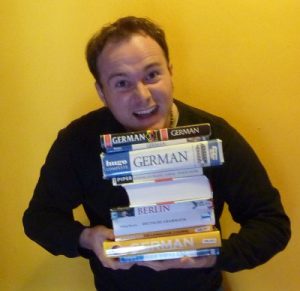German 3 month mission: Sit C2 exam
Take Note: I wrote this post while preparing for my German mission in Berlin back in 2010. It's a good post to read when preparing for your next language mission, so you can see what I take into consideration and how I approach short and long term goals. Enjoy!
OK, I've had several months of a break from full language immersion, but it's time to get back to what I know and love!
In a few short hours I'll be flying into Berlin where I'll be spending the next 3 months! The next mission is of course German.
My mission will be to convince Germans that I'm a Berliner by the end of June, and to sit the Goethe-Zertifikat C2: Zentrale Oberstufenprüfung examination. The level required for this examination goes way beyond fluency; it is for Mastery of a language.
So, you would have to be crazy to attempt it without years of intensive study. Or, if you plan to do it in 3 months time, you would want to already be speaking at an excellent level right now. The only problem is… right now, I don't speak German!!!
The familiar story of a wasted academic background
All the languages that I am currently fluent in have been picked up through immersion, avoiding English, and applying a positive attitude while remaining committed to make sure my level was constantly improving; using the language hacking techniques I discuss on this site and will elaborate on in the guide. I have never taken academic courses (or audio/software based courses) in any of them.
Despite that, you may be surprised to hear that I actually studied German for 5 years before going to University – it's the language that I've put the most work into, and yet, right now I couldn't even order breakfast in German if I wanted to. You'll notice that it is not one of the flags I've included on the right of this site as a language that I speak.
I know all about the Accusative/Nominative/Dative cases and the various ways to say the (der, die, das, den, dem…), I know that the order that words appear in a sentence goes by Time then Manner then Place, and that the second verb goes at the end if there is an auxiliary verb. I can reproduce tables of rules and I can read some text and have a pretty good idea what it's about.
But I still don't actually speak German.
Since I was an English teacher for several years, I know that there are good ways to teach a language. However, sadly, most of the English speaking world does not teach foreign languages well and even after years of investment, lots of us are still left scratching our heads when we actually need to speak.
I did try though – I spent several weeks in Munich and a month in Freiburg (both in south Germany) a few years ago. I felt like I was starting over from scratch, but even so, I managed to start speaking a little. I even lived with two Germans in Spain for several months and got to practise even more. But it was never enough to actually feel like I was really speaking; this was very early in my travels and well before I had improved my language learning technique.
Despite any confidence in my abilities in other languages, the countless times that I have met Germans, Austrians and (German) Swiss over the years have pretty much always required the conversation to be in English (or another language that we both speak). It's embarrassing considering all the time and homework that I have done for German, and to be honest I've had enough of this feeling! 🙂
So I want to see if I can turn those wasted academic years into something useful, and achieve fluency in a short period of time. I feel like lack of vocabulary and familiarity with speaking are the main things holding me back, since I genuinely do understand the grammar of the language. I am not starting over from scratch; I want to make something of that academic background!!
This means that I'll be aiming to speak fluently in just a few weeks! If that goes according to plan, then I'll be ready to take on my greatest challenge yet.
The C2 level exam: Think “very hard” & multiply that by a thousand
The Common European Framework of References for Languages level C2 is one of the hardest possible examinations you can do in any language. The system used in Europe for competency in languages splits levels into A1, A2, B1, B2, C1 and C2, starting from “breakthrough” at A1 where you may have a few basic phrases, and ending at C2 where you understand virtually everything and join in on conversations with ease.
I have the DELE Superior C2 diploma in Spanish from the Instituto de Cervantes, so I know exactly what this level means. It's ridiculously hard! For those of you who think I should be realistic and do the B2 or C1 exam first… well, I did that in French and was annoyed that it wasn't harder 😉 I love a nice challenge! 😀
You do not need to attend any course to sit the exam; you just pay the fee and show up on the examination day, and that is what I intend to do at the end of June. I can't promise that I'll pass it, but you can bet that I'm going to be trying my best to do so!
The exam consists of a written section: text analysis, essay and listening comprehension. Plus an oral examination. A passing grade is broken up into ‘very good', ‘good' or ‘satisfactory'. I would of course be quite satisfied with satisfactory, if there is a chance that I can get it! 😀
When I am more familiar with the exam itself, I can see what chance I have of passing it and what to aim for. I want to at the very least get quite a good grade in the oral section, even if I don't achieve an overall pass. That alone will require huge amounts of work, and I intend to do my best in the other sections too, of course.
The Goethe Institut recommends 1,200 hours of advanced tutorials, but this will be nothing more than a part-time fun project for me (as the Spanish DELE was). I'll also be working full time, and even trying to write a language hacking guide which will include several books and audio interviews, as well as trying to have an active social life and going out with Germans :). So, I may be aiming way too high this time! But, I tend to do that a lot 😀 – it's good to aim for the stars even if you just land on the moon 😉
I'll do the same things I did with the DELE to give myself the best chance of passing this exam, and of course will share all the tips and progress (and result, no matter what it may be…) on this blog 🙂
Convincing Germans that I'm German
The more fun part of this mission will be something similar to what I achieved with my Portuguese in Rio; I want to meet a native for the first time and talk to them, and have them genuinely and honestly think that I'm also German for up to 30 seconds. 30 seconds may not sound impressive, but this is a very long time to be in an active conversation and not slip up, especially considering my time limit of 3 months to do so.
This mission will involve me speaking German fluently first, then reducing my accent to be as imperceptible as possible, while adapting to German body language and mannerisms as accurately as I can. I will consider this part of the mission a success if several different people that I've just been introduced to, who don't know me, thought that I was German before noticing a mistake, 30 seconds or more after the conversation has begun.
I don't want to convince any linguists; just random people that I meet naturally in social events.
I've been told that the Berlin accent is hard to pinpoint and that many Germans in Berlin aren't even from the city. I'll work toward standard German, but I'll be focussing on the northern dialect that would be expected more in Berlin, to have a specific dialect to aim for.
Considering the fact that I don't speak German right now, this should be interesting 😀
The great input experiment
Since vocabulary is a big weakness for me in my German right now, I will be changing my social learning approach slightly and trying some input learning techniques that so many of the site's readers have gotten a lot out of!
I will be reviewing many different input techniques from a language hacking perspective. I want to know what way I can learn words the quickest and the most efficiently, and of course which one is the most fun! I'll be trying out SRS, Livemocha, podcasts and several other methods, each one just by itself for 1-2 weeks and reviewing them for how good they fit in with my idea of language hacking.
Some parts of my reviews will go on the blog, more details will be included in the weekly language hacking league tips e-mail (sign up on the right) and the most important parts of my analyses will be a part of the guide. I'm also hoping to conduct audio interviews with those most familiar with these techniques, to include with other interviews in the guide. Hopefully I will find something that works well with what I do already, and I'm sure that my reviews will come in handy for people as I give the advantages and disadvantages of the methods as I see them, so a reader could pick one that that suited them best. All methods that I will be investigating will be free or very inexpensive.
So, join me over the next 3 months as I try to become a Berliner!




Social